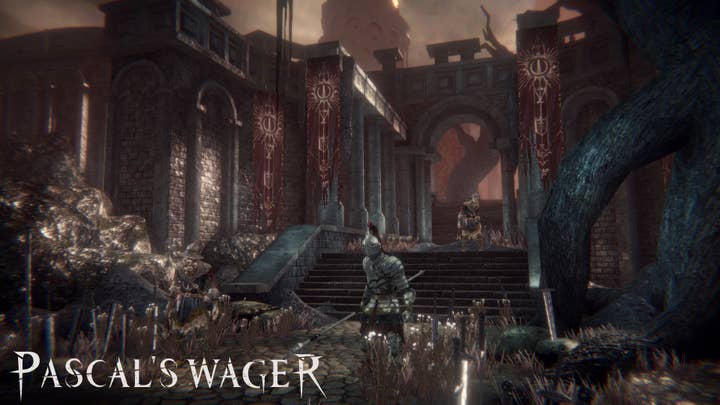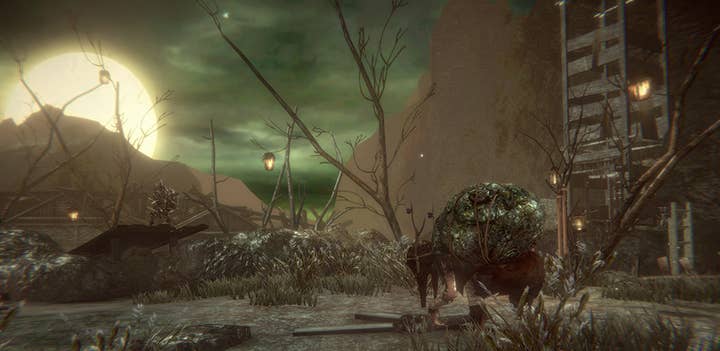Giant Games' wagers: Premium mobile models, and Western markets
CEO Bill Wang explains why Giant Network's new publishing arm is focused on bringing Chinese games to global audiences
11 years ago, Bill Wang was working with Perfect World to bring its MMO of the same name to international audiences. At the time, he says, it was easy to launch a free-to-play game in the West.
"Back then, there wasn't as much competition in the market," he says. "Free-to-play was new to many Western developers. So by launching our high-quality, free-to-play game Perfect World internationally, we were able to crack the market and grow from there. With a strong cashflow, were able to acquire and invest in more developers in the US. Back then, there was not much competition. But today, [you have] Tencent here, NetEase here, Epic, all actively investing in developers and acquiring content. So the market is very competitive."
It isn't just the market that's changed. Wang isn't with Perfect World anymore, having accepted a new role just over a year ago as head of Shanghai-based Giant Network's new US business: Giant Games. While the parent company has been around since 2004 and has about 2000 employees, Giant Games is a much smaller endeavor of around ten people based in the Bay Area. Its focus for now is on global launches of games made by Giant Network's existing Chinese partners, including Night of the Full Moon, Undying, and an upcoming premium mobile title called Pascal's Wager.
Why start a Western business after all these years? Wang says it's in large part due to increased Chinese government restrictions on game approvals in recent years.
"For most Chinese publishers and developers, it's very hard to launch new titles in the local market," he says. "They are forced to go overseas. Giant Network has been looking into Western markets since 2017."
Pascal's Wager is a particularly good example of Giant Games' business strategy. Developed by Chinese studio TipsWorks, the game's iOS release and promotion overseas effectively represents two different gambles being made by its publisher: one on the potential for Chinese-developed games overseas, and another on the potential for premium mobile titles worldwide.

Wang says that while the premium mobile model has historically struggled against the dominant free-to-play model in China, Giant Network saw potential in what TipsWorks had to offer, and acquired the studio in early 2018 to support it in finishing the game.
"When we saw Pascal's Wager in late 2017, we were pretty impressed by the quality," he says. "The development team pitched Pascal's Wager to most of the publishers in China, but nobody thought a premium single-player mobile game had any future. But we were impressed with the team. The founder of the studio, TipsWorks, got sick with a kidney issue and had to go through dialysis three times a week, but he was still focused 100% on development and put all his money in development. He had no money to get a new kidney. We were pretty impressed by his dedication to Pascal's Wager, which is one of the reasons we decided to invest in the team."
I ask Wang later to clarify if this meant Giant Games took sacrificing personal health to make a game as a positive when considering developers to support.
"The founder's health wasn't a plus when we considered this opportunity," he replies. "However, this issue didn't deter us from acquiring the studio as we were impressed by the talent there and the founder's dedication to this project."
(TipsWorks founder, Yang Yang, did get a new kidney last year.)
"People used to think there was a big quality gap between mobile games and console games. But today, the gap has gotten much smaller"
Wang returns multiple times during our chat to the importance of quality, and the high bar that Pascal's Wager strives for. That, he says, is the other reason why Giant was willing to support the game where other publishers would not. Despite the state of the premium mobile market, Wang thinks that a mix of more powerful mobile technology drawing "hardcore" gamers to mobile and a promise to eventually bring the game cross-platform will ensure Pascal's Wager's success, regardless of its business model.
"There were concerns from Chinese publishers when they saw the game," Wang says. "They said the game quality was good, but there was not much potential from the revenue and profit perspective. We think about it in a different way. We think that today, going cross-platform is the approach to take, similar to PUBG or Fortnite, which have proven that when you go multi-platform, you can create a bigger userbase. For Pascal's Wager, we saw potential in going multi-platform from mobile to PC and console, and also for mobile players.
"People used to think there was a big quality gap between mobile games and console games. But today, the gap has gotten much smaller. We want to be one of the first ones to launch console-quality mobile games. We think it's a niche market, and that hardcore gamers want to play high-quality games. They don't think about price. They don't worry about paying $6.99 -- it's not a big burden for them. So we want to target those users. There might not be 100 million users there. But if we can sell, for example, one million or two million, that'd be great."

$6.99, incidentally, is the amount Pascal's Wager will cost at its iOS-exclusive launch this month, with paid DLC planned for later. It will come to Android sometime later, and PC and console after that with enhancements to graphics and control adjustments to fit it to the latter two platforms.
"The userbase for iPhone has bigger spending power, generally speaking, than Android users," Wang says when I ask him why they opted for an iOS-exclusive launch. "For premium games, it's easier to succeed on iPhone than on Android devices. If you have free-to-play games, definitely do both from the beginning. But we want to target high-end users with cutting-edge graphics, and the iPhone 11 is the perfect platform."
"The userbase for iPhone has bigger spending power, generally speaking, than Android users. For premium games, it's easier to succeed on iPhone than on Android devices"
So why did it make sense to show off a new premium game on iOS at the same event as news about a subscription service being sold as an answer to the struggles of premium mobile titles?
"We were offered to publish games on Apple Arcade," he replies. "We decided not to do that, because our quality will stand out among other mobile games. We want this game to be a long-lasting franchise. We have a title for Apple Arcade in the future, but for Pascal's Wager, we wanted to make sure it succeeded by itself."
I press him on why premium was the best choice for a game like this, with so many developers opting out of this business model in favor of, if not models like Apple Arcade, then simply free-to-play titles with microtransactions. Wang disagrees, pointing at an increase in "hardcore gamers" playing on mobile, and preferring to pay for games outright over what he calls "pay to win" models or paying for cosmetics.
"We see more and more people playing on mobile phones, even hardcore gamers. Today, most successful franchises, including Call of Duty, have mobile games. We think people will play games at different locations. They can play at home in front of the TV, on the road on their phone, and hardcore gamers play games across different devices. I don't think that's a restriction anymore. You don't only target hardcore gamers on console and PC."
"Today, most successful franchises, including Call of Duty, have mobile games...I don't think that's a restriction anymore. You don't only target hardcore gamers on console and PC"
Once a handful of Giant Network titles are successfully launched in the West, Wang says Giant Games will begin seeking partnerships with other North American and European developers to invest in, acquire, and publish their games worldwide.
Wang adds that his and Giant's willingness to support these games should be seen as part of a broader philosophy to support high-quality content regardless of the business model behind it.
"I met Unknown Worlds in San Francisco [in Wang's previous job working with Perfect World]," he says. "They made a premium, multiplayer game called Natural Selection 2. It did okay, but I was really impressed by the founders, Charlie [Cleveland] and Max [McGuire]. Later, they decided to work on an underwater, single-player exploration game. When my colleagues from China came to the studio, they told me, 'No chance this game can succeed. No one wants to play a single-player, underwater exploration game. No chance.' But I trusted Charlie and Max. So when they launched Subnautica, the game became a huge success. Sold over two million copies across PC and console. That's a studio I invested in almost six years ago, and when they made a single-player game, no one from [Perfect World] thought they had a chance.
"So same story. Many people don't believe [Pascal's Wager] will do well, but we believe in quality. That's my belief from past experience working with developers like Unknown Worlds, Runic, Double Damage. You can create great content no matter what kind of business model you use. It's not about business model, it's about content."

